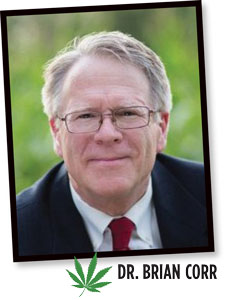3/1/2018
Altered Perceptions
Dr. Brian Corr

One thing cannabis can do is alter perceptions. Understanding the cannabis industry can change perceptions too. For many people, the perception of someone growing cannabis is a hazy image of some long-haired, unbathed, tie-dyed stoner. That image may apply to some underground growers, but isn’t accurate for businesspeople active in the cannabis industry.
The people I’ve met are serious professionals with no resemblance to Cheech and Chong; most come from backgrounds with no connection to cannabis.
For example, Jonathon Goldrath is far removed from the “stoner” stereotype. He dresses conservatively, has a well-groomed beard and looks like he could work at an investment company. In fact, he did.
Jonathon is one of the founders of Standard Farms in Pennsylvania. Standard Farms earned their license in June 2017 and will harvest their first crop soon. As a financial analyst, Jonathon recognized there were cultural and economic changes underway in the United States and began the arduous process of applying for a medical marijuana license. Cannabis is just one of many business opportunities he evaluated … one he’s pursuing now with enthusiasm.
Also at Standard Farms is soft-spoken, thoughtful, research-oriented Paul Karlovich, the Chief Cultivation Officer. He earned a PhD in Horticulture from Iowa State University and for many years worked at C. Raker and Sons as General Manager and Director of Research. He joined Standard Farms just as the greenhouses were completed and has shepherded the plants along to the first harvest. He told me growing cannabis was not very different from other crops, saying something I’ve heard many times: “It’s just another crop”—albeit, one with some unique challenges.
One of the most interesting people I’ve met in the cannabis world is Chapman (Chap) Dickerson, cultivating medical cannabis at Coastal Compassion in Massachusetts. Cannabis cultivation is a long way from where he started. Chap joined the military after high school. After his service, he worked first as a Certified Nursing Assistant (CNA) then on fishing boats, rapidly progressing to captain at the early age of 26. As captain, he learned to manage people and take care of equipment.
While stationed in Europe, he’d seen the “coffee shops” of Amsterdam, with people of all colors and walks of life together. He also met people on fishing boats using cannabis to alleviate symptoms of seasickness. He told me he would much rather work with people smoking cannabis than those using drugs that impair their safety on the boat. Those observations led him to be an activist for moderate cannabis laws and eventually to legal cultivation.
Brad Assim is a Canadian businessman who’s just launched a cannabis business in Ontario, Canada. He’s part of a family with over 70 years of experience growing specialty crops—first tobacco, then ginseng and soon cannabis. Cannabis is just another high-value, specialty crop, though one produced in a controlled environment. Brad points out that growing in a greenhouse removes some of the problems with cultivating tobacco or ginseng—hail, late or early frosts, flooding, etc.
Brad commented there’s little to no stigma to operating a cannabis business in Canada. Most Canadians have concluded there are benefits of cannabis profits going to legal enterprises rather than to smugglers, street dealers or cartels. He says Canada will be a test for what it’s like when a major economy has nationwide legalization of cannabis and will be a “pilot project” for the rest of the world.
These businesspeople see similarities and differences in their new career to their previous activities.
Jonathon said he’s found hiring can be challenging. Some portions of the talent pool are closed off because they’re not willing to take the risk of entering such a regulated (and still federally illegal) industry.
Paul noted that in contrast to the ornamental plants he previously grew, there are no suppliers of unrooted cannabis cuttings. Every cannabis grower in Pennsylvania must grow mother stock and produce cuttings. He also noted the regulatory aspects of cannabis production are unlike other parts of horticulture—background checks for employees, security cameras and, of course, record keeping to account for every gram of plant material.
All say growing cannabis can require long hours and hard work. Chap points out that lobster pots are a lot heavier than cannabis pots, but moving either is still a good workout. Whether in the military, a CNA, a fishing boat captain or raising cannabis, he says the hours are long, but hard work pays off.
I’ve never spoken with anyone who regrets working in the cannabis industry. Regardless of previous experience, they say it’s exciting to be a part of a rapidly growing industry. GT
Dr. Brian Corr is a consultant with more than four decades of experience in the greenhouse industry. He has advised legal cannabis producers for the last three years. You can reach him at Brian.Corr@SycamoreHortConsulting.com.